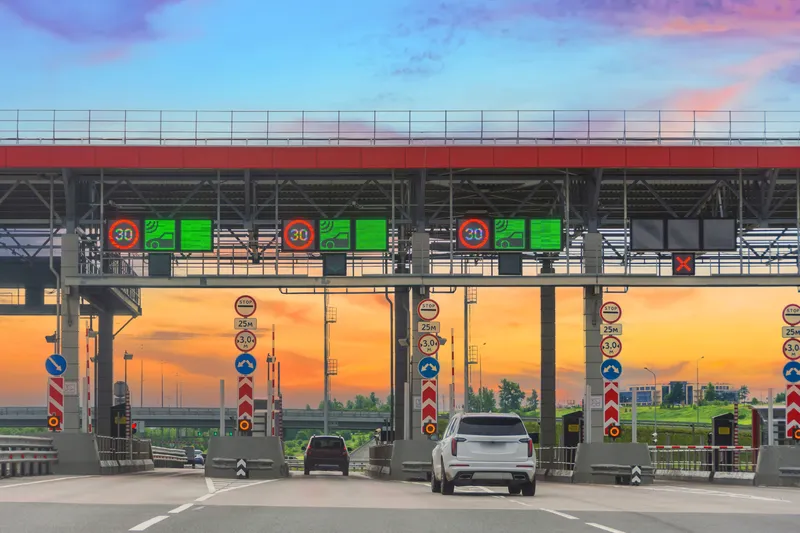
Road pricing is already used worldwide to combat congestion and pollution, to compensate for falling revenues from fuel duty (‘gas tax’), to provide an alternative (and fairer) means of charging motorists than the 80-year old fuel tax and to improve the efficiency of and expand transport infrastructure. However, it could and should be used far more widely. As Rod Eddington’s 2006 report for the British government, The Eddington Transport Study: Transport’s Role in Sustaining UK’s Productivity and Competitiveness: The Case for Action, stated: “The potential for benefits from a well-designed, large-scale road pricing scheme is unrivalled by any other intervention.” That view was endorsed by the UK
Strong feelings
However, national and local governments worldwide have been reluctant to adopt road-pricing policies in the mistaken beliefs that:
a) the technology is not yet ready; and
b) voters are implacably opposed to such policies.
This latter belief is not without foundation. The Edinburgh (2005) and Manchester (2008) referenda and the 2007 petition on the prime minister’s website in the UK, and the referendum in Gothenburg in Sweden, show that some people feel strongly about the subject - and vote against it. However, the evidence is that once they have experienced the benefits, people will vote for road pricing, directly (as in Stockholm and Milan), or indirectly (based on political manifestos, as in London) – especially if other charges and taxes are reduced to compensate, and if any additional revenues are reinvested in transport. (One may learn more from failures than from successes; Manchester did not learn the lessons of Edinburgh. And of course one also learns from successes, as in Milan).
Myth busting
Another myth is that the press is always opposed to road pricing – they were for it in New York. The British Daily Mail newspaper, often regarded as anti-road pricing, designated a businessman who built a temporary toll road around some long-term roadworks that were impeding his commute as ‘a hero for our time’. He “should be knighted in the next honours’ list”, the paper said. “He is an inspiration.”
Toll roads have a long history; there were tolls on the Susa-Babylon highway in the 7th century BC, and in the Holy Roman Empire in Europe in the 14th century AD. They facilitated the Industrial Revolution in England in the 18th century via the turnpike roads, leading to an expansion in highways, better road maintenance, and increased economic activity - lessons for us in 2018. (The railways came much later, from the 1820s onwards). So we are living in a period of historical anomaly, where roads are mostly free at the point of use. Of course, roads are not free – we pay for them through our taxes, which are often regressive – the poor pay proportionately more, and effectively subsidise the rich. It would be fairer to accept the ‘user pays’ principle.
Congestion costs
Road pricing is inevitable – it is the most powerful means of addressing the problem of declining fuel duty (‘gas tax’) revenues as well as congestion and pollution. Roads are congested, especially during rush hours in cities, and motorways at Bank Holiday weekends. Congestion was estimated to cost £13 billion in 2013 in the UK, increasing to £21.4 billion in 2030. The figures are ten times this in Europe overall; in the US in 2014 it was estimated to be $160 billion, with 6.9 billion hours of travel delay and 3.1 billion gallons of wasted fuel. Such estimates depend on the assumptions made - but the costs are enormous and will increase unless something is done.
Health risk
Air pollution, especially NOx and particulates, to which the biggest contributor is road traffic, causes 50,000 premature deaths per year in the UK - 30 times the number of people killed on the roads annually. (There were 1,732 reported road deaths in Great Britain in 2015). Air pollution is now the world’s largest single environmental health risk - the impact is highest in Asia but significant in Europe and the USA. In 2012, seven million people died as a result of air pollution exposure - one in eight of all deaths worldwide, compared with 1.3 million global road accident fatalities.
Road traffic emissions also contribute to global warming. Of the 568.3 million tonnes of CO2 equivalent - the total net UK emissions from all sources - 21% were from transport, up from 15% in 1990, of which 93% were from road transport. Furthermore, revenues from vehicle taxation are declining. The







